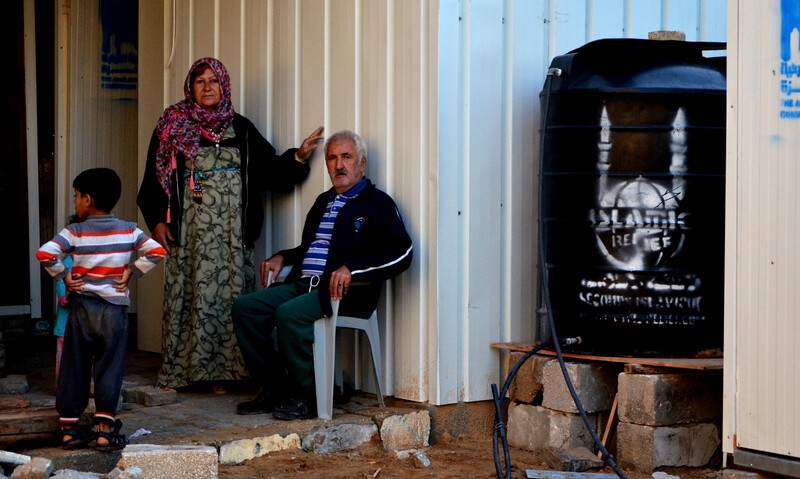The Electronic Intifada Gaza Strip 18 November 2014

The al-Masri family made a living from their citrus trees but are now dependent on international aid agencies after Israel destroyed their farmland.
Abdelrahman al-Masri spent many years of his life working on a citrus farm in Beit Hanoun, a town in northern Gaza. So have his sons. But growing fruit on their land — continuously tended since the 1950s — is not possible today.
“Where you are standing used to be the homes and farmland of my sons and I — before Israeli bulldozers came over here during the land invasion and destroyed everything,” he said. The damage caused by Israel’s attack on Gaza during the summer is unmissable. Part of the family’s land is now covered in a heap of rubble.
Abdelrahman, who is in his sixties, suffered a stroke. He has been left partly paralyzed.
Today, Abdelrahman and many members of his extended family are living in his son’s home. Unlike other buildings where the family lived, it was spared by Israel in July and August.
During the attack, the family took shelter in a school run by UNRWA, the UN agency for Palestine refugees, in the nearby refugee camp of Jabaliya. Abdelrahman is now waiting to move into another temporary abode: a metal shack provided by an international aid agency.
“We have turned poor”
Um Raed, his wife, said: “We used to earn good money every year, out of our citrus farm. We used to give charity to impoverished neighbors. But now we have turned poor ourselves because of the war.
“What a desperate life that we have now. I do not even own basic furniture. I don’t have a gas stove; as you see, we use wood to cook some food for the grandchildren.”
Jibreel, one of Abdelrahman’s sons, said that he and three of his brothers have been trying to make shacks allocated to his family fit for habitation. “During the last rainfall in Gaza, we noticed water leaking in these shacks,” he explained. “That discouraged us from living inside them.”
Um Raed added: “It is a total injustice that we are left in this situation. We do not want these shacks. We want our homes to be rebuilt sooner, not later.”
Needs not met
A recent United Nations assessment concluded that 100,000 homes were destroyed or damaged by Israel in Gaza during the summer. Some 600,000 people have been affected.
Earlier this month, UNRWA reported that more than 27,000 people were still being sheltered in its schools.
Nabil Abu Muailek, chairperson of the Palestinian Union for Contractors in Gaza, told The Electronic Intifada that reconstruction in Gaza requires approximately 5.5 million tons of raw building materials, including 1.5 million tons of cement.
So far only a tiny fraction of the required amount has been delivered to Gaza.
On Monday this week, Jens Toyberg-Frandzen, a senior UN official, announced that just 1,086 people in Gaza had so far been able to buy building material under the “temporary Gaza reconstruction mechanism.” The material included 10,416 bags of cement.
The “reconstruction mechanism” was agreed between the Palestinian Authority and Israel in September. Under it, Gaza’s residents may buy cement and other material from designated vendors. This means that ordinary people are being required to pay for rebuilding homes that were attacked by the Israeli military.
Pandering to Israel’s whims
The UN authorities have agreed that Israel may monitor the reconstruction projects and effectively decide who can and cannot rebuild. Toyberg-Frandzen stated that UN constructions projects budgeted at $62 million are awaiting Israeli approval. Israel allows only 350 trucks of building material into Gaza per day but has undertaken to raise that limit to 800 trucks.
Samir Zaqout, a spokesperson for the Gaza-based Al Mezan Center for Human Rights, argued that the mechanism is prolonging the siege of Gaza. He rejected Israeli claims that the controls on it are necessary to prevent resistance fighters from rebuilding tunnels that Israel destroyed during the summer.
Rather, he suggested that its real purpose was to make the reconstruction of Gaza subject to Israel’s whims.
A committee for the entry of goods set up by the mechanism will include Israeli representatives. If every person who seeks to rebuild his or her home is checked by the committee, it will “perpetuate the reconstruction process,” Zaquout said.
He complained that international donors have long been willing “to pay the bills” for the suffering that Israel inflicts on Gaza. “What is needed is bringing Israel to justice, so that they won’t repeat [the attacks],” he said.
Rami Almeghari is a journalist and university lecturer based in the Gaza Strip.





